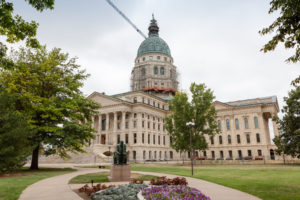
As Kansas lawmakers kick off the 2018 legislative session, they’ll be inundated with a number or legislative platforms from cities, counties, labor unions and advocacy groups hoping to advance or kill legislation related to everything from Kansas Open Records Act requests to a property tax lid to school financing.
Many political watchers recognize that groups like the Kansas State Rifle Association and the Kansas National Educators Association forward public policy stances of their members. However, public bodies, like school boards, city councils and county commissions do so as well.
Rep. J.R. Claeys, a Salina Republican, said he does take a look at legislative platforms presented to him.
“I’ve used them in the past as support for an issue,” Claeys said. “When they contradict the opinions of the district, though, absolutely not.”
The Salina USD 305 school board’s legislative platform includes Medicaid expansion, for example.
“I’m not interested in that,” Claeys said.
The Johnson County Board of Commissioner platform also includes a call to expand Medicaid, and many county commissions urge KS lawmakers to repeal of a property tax lid adopted in 2015. The lid requires cities and counties to seek approval from voters for property tax hikes above the rate of inflation.
“We believe those elected to manage the affairs of cities and counties can be most responsive to the local taxpayers and make budget and tax decisions that are most reflective of the community’s needs and financial interests,” the Johnson County platform reads. “We note these same taxing and spending limits on cities and counties were not placed on state government.”
Claeys says many Salina groups present their legislative platforms to lawmakers in small meetings, and he uses the opportunity to share his personal legislative priorities.
“You always want to be conscious of things you can work together on, even from groups you might disagree with a majority of the time,” he said.
School finance will be the biggest issue during the 2018 session as lawmakers work to meet a court-imposed deadline to draft a new school financing formula, and many platforms weigh in on the topic. The Kansas Association of School Boards legislative platform addresses school funding in almost every objective. To attract and retain teachers, KASB recommends policies that “provide foundational (base) funding” adjusted for inflation, and fully funding “state professional development and mentoring programs to improve teaching and implement school redesign.”
It also requests increased funding for preschool programs, fully funding tuition for high school students in post-secondary technical programs, and eliminating or modifying a state requirement that school boards use 65 percent of state funding for instruction.
Local school boards often adopt their own list of legislative priorities. The Blue Valley School District, for example, opposes using tax credits to help parents send their kids to private and charter schools. Though school districts are exempt from the property tax lid adopted by the Kansas Legislature in 2015, the Blue Valley board weighs in on the topic, opposing any lid that might tie tax rate increases to population and inflation. Its platform includes support for maintaining non-partisan school board elections and returning those elections to a spring timeframe. The board also supports a right to request judicial review of school financing.
Rep. John Whitmer, a Wichita Republican, said he reads through the legislative platforms provided to him, but he doesn’t necessarily take all of their suggestions.
“It’s nice to know what they’re interested in. I look at them,” Whitmer said. “I like to watch how they change and evolve as their elected bodies change.”
Claeys said it’s important to recognize that many times, the people who write and adopt legislative agendas for cities, counties, schools and even advocacy groups don’t necessarily reflect the views of people at-large or even the people of a local district like his own, the 69th. He lists a Salina economic development commission as an example.
“I know that even our newest economic development commission doesn’t have a single representative from the 69th district,” Claeys said.


